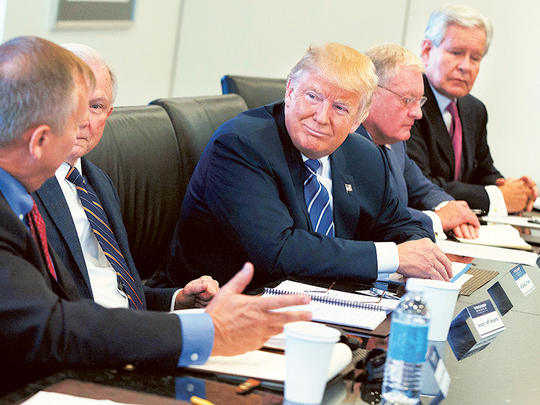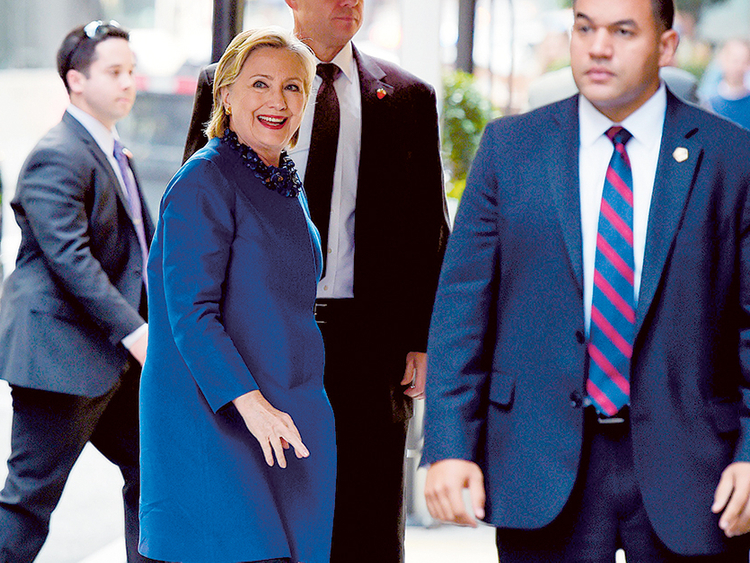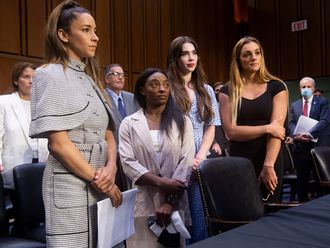
Washington: Republican leaders began to abandon Donald Trump by the dozens on Saturday after the release of a video showing him speaking of women in vulgar sexual terms, delivering a punishing blow to his campaign and plunging the party into crisis a month before the election.
Fearing that his candidacy was on the verge of undermining the entire Republican ticket, a group of senators and House members withdrew support for him, with some demanding that he step aside. Trump, however, vowed to stay in the race.
The list of party figures publicly rejecting Trump included a host of prominent elected officials, perhaps most notably senator John McCain of Arizona, the 2008 nominee.
“I thought it important I respect the fact that Donald Trump won a majority of the delegates by the rules our party set,” McCain said in a statement. “But Donald Trump’s behaviour this week, concluding with the disclosure of his demeaning comments about women and his boasts about sexual assaults, make it impossible to continue to offer even conditional support for his candidacy.”
And in an unheard-of rebuke by a running mate, governor Mike Pence of Indiana, the Republican vice-presidential candidate, declined to appear on Trump’s behalf at a party gathering in Wisconsin and offered him something of an ultimatum Saturday afternoon.
Pence said in a statement that he was “offended by the words and actions described by Donald Trump” in the video and cast Trump’s second debate with Hillary Clinton, on Sunday, as an urgent moment to turn around the campaign.
“I do not condone his remarks and cannot defend them,” Pence said, adding, “We pray for his family and look forward to the opportunity he has to show what is in his heart when he goes before the nation tomorrow night.”
By Saturday evening, no fewer than 36 Republican members of Congress and governors who had not previously ruled out supporting Trump disavowed his candidacy, an unprecedented desertion by the institutional Republican Party of its own standard-bearer.
The growing wall of opposition recalled the determination of the party establishment this year to deny Trump the nomination in the first place. He easily swatted away that effort, but Trump now finds himself in a far more precarious state. Facing a vast and diverse electorate, his lightly organised campaign was already listing before the videotape was released.
Aides described Trump as shaken, watching news coverage of the video with a mix of disbelief and horror. Shortly after midnight, he had released a videotaped statement, saying, “I’ve said and done things I regret, and the words released today on this more than a decade-old video are one of them.”
In a brief telephone interview on Saturday, he shrugged off the calls to leave the race, saying he would “never drop out of this race in a million years.”
But the situation had grown so dire that many in the party were all but pleading with him to withdraw and let Pence serve as the presidential nominee. On Saturday afternoon, senator John Thune of South Dakota, chairman of the Republican Conference, became the most senior Republican to call on Trump to make way for Pence.
The exodus began late on Friday when a handful of Utah Republicans who said they would support Trump indicated that they no longer could tolerate their nominee.
But it was not until a pair of conservative women, US representatives Barbara Comstock of Virginia and Martha Roby of Alabama, implored Trump to withdraw that previously hesitant Republicans stepped forward to reject Trump’s candidacy.
Kelly Ayotte of New Hampshire was the first Republican senator facing a competitive re-election to say she would no longer back Trump, announcing in a statement that she would write in Pence for president instead.
“I’m a mom and an American first, and I cannot and will not support a candidate for president who brags about degrading and assaulting women,” she wrote on Twitter.
Ayotte was joined just hours later by McCain, who is also running for re-election, and representative Joe Heck of Nevada, who was locked in a close race for the Senate seat held by Harry Reid, the Democratic minority leader, who is retiring.
It was an admission that Trump posed an immediate threat to their own candidacies and that, to have any chance to survive, they had to risk angering his ardent supporters. At a party gathering on Saturday in Wisconsin, House Speaker Paul Ryan, who had disinvited Trump and said he was “sickened” by the video, was greeted with a few boos. Heck was both jeered and applauded when he announced to a crowd in Nevada that he was not backing the presidential nominee.
Ryan told his crowd he would not be discussing “the elephant in the room”, the 2005 video showing a bus that had Trump aboard and included an audio recording of him privately bantering with other men.
Inside Trump Tower, Trump’s defiant public responses belied the reality of a 24-hour period in which he was alternately angry and distressed, according to two people with direct knowledge of his behaviour, who were granted anonymity to discuss private conversations.
Trump and his son-in-law, Jared Kushner, initially expressed scepticism upon hearing that such a recording existed, saying those comments did not sound like him. When Trump heard the tape played, he acknowledged it was him, but he believed the fallout would not be dramatic.
Pence, however, was dismayed and called into Trump headquarters Friday night to urge Trump to apologise.
On Saturday morning, Pence called Trump and told him he had to handle the next 48 hours alone because he did not think he would be an effective surrogate.
Trump, after monitoring television coverage, realised he was becoming isolated by his party.
At the same time, leading Republicans were demanding that the Republican National Committee, which has been helping the Trump campaign financially and organisationally, abandon Trump and turn its attention to salvaging other candidates down the ballot.
US representative Charlie Dent, the Republican from Pennsylvania, said the committee should no longer “defend the indefensible.”













